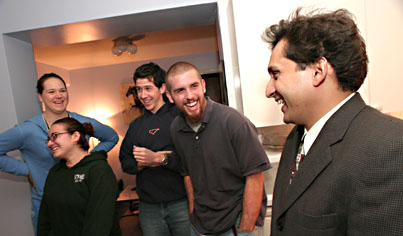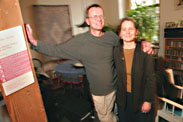
Left to right: Students Kimberly Evans (Social Work), Carly Boyce (Arts), Conley Forey (Management) and Nathan Loomis (Economics) talk with Murtaza Haider, professor at McGill's School of Urban Planning
Owen Egan
The art of living in residence
By most standards, Murtaza Haider has scored pretty choice digs in Gardner Hall, a McGill student residence comprised primarily of spare dorm-style singles. He has a suite that encompasses a freshly painted bedroom, living room, kitchenette and study nook, and affords a postcard view, past crisp new curtains, of Mount Royal's verdant northeast face. It even has a bathroom. "Of course," he admits, "my wife would prefer a house in Outremont..."
Right, I forgot to mention that Haider is married, 30-something and a professor in McGill's School of Urban Planning and Department of Civil Engineering and Applied Mechanics. So why have he and his intrepid wife chosen to make a home in the comparatively spartan, manifestly public, perennially rowdy environs of the Rez? Haider has begun a three-year stint as hall director. He is the latest in a long line of McGill academics who have called their hall "home" since the university's residence system was founded more than a century ago. Today three of eight McGill residence halls and clusters are headed by live-in faculty members; the rest are directed by graduate students and others closely connected with the McGill academic community.
Their mandate is to provide first-year students first-name access to McGill's vast academic, health and social resources, and to keep the peace. It takes a certain kind of adult to live well amongst 18-year-olds willingly.
"I refer to it as a calling -- in brackets," says Flo Tracy, the director of McGill Residences and resident director of Royal Victoria College for the past 25 years. "We look for academics with certain standards, flexibility, a sense of humour, genuine warmth and sincerity. It requires an openness and willingness to go the extra mile for students, and an ability to live with our philosophy. We really have only one rule, which is very different from other residence systems: respect. For oneself, for neighbors, for the building. We don't have 'Thou shalt not...' "

Educational psychology professor Michael Hoover
Owen Egan
It may seem odd that academics would weather a stringent vetting process and exhaustive training, and confine themselves to a cramped apartment subject to frequent interruptions, all for free room and board and the privilege of living as an in-house Solomon, sage and, occasionally, sitter for first-year college students. But Tracy claims it's a perfect fit for some: "We typically get people who are recently divorced, recently married or young single newcomers to the university. And they think, 'This seems like a good idea. I've got some time or I'm in a period of change.' It has worked beautifully for all kinds of people."
Even people with children, at least for a while. Haider inherited the director's apartment at Gardner from Jim Nicell, a colleague in Civil Engineering, and his wife, Donna, who decided to move out of the director's apartment after the birth of their second child. Haider has no children of his own, but he comes to the job with the confidence of one well-acquainted with the teenaged of the species. "When we were considering this post, my wife and I realized that we had been doing this on an informal basis for years," he explains. "We have many older friends who have always called us to talk to their teenage son or daughter about this or that. They seem to feel comfortable around us."
Little wonder. Growing up in Pakistan, both of Haider's parents were professors; his world was populated by students dropping by for tea and a chat. "I developed this into my lifestyle," he says. "I didn't know that most people don't live this way."
Neither did Michael Hoover, professor of Educational Psychology, who came to live at McConnell Hall in 1990, shortly after his arrival at McGill. To the son of a university chaplain and a life-long academic, McConnell felt like home right away. "I've lived only 18 months of my life not on a college campus (or within three blocks)," Hoover says. "And I didn't like it."
Now he has lived in the Rez long enough to be a certified oracle. But you'd hardly describe Hoover as an éminence grise. Maybe it's the "Jonny Quest" welcome sign on his door, advertising the home of "Professor Mike." Or the "Buffy the Vampire Slayer" DVD collection that shares shelf space with ponderous academic tomes. Hoover is a fuel cell of energy with a mischievous air. If you squinted, you might mistake him for a student. Okay, a grad student. But, in fact, he's very much in charge, a formidable presence in the building to back up his hand-picked floor fellows, upper-level students who keep a watchful eye for problems arising in the building. "A big part of the job is just being here to give people a reason not to do something," he says. "Because otherwise, when you're 18 or 19 years old and have had some drinks, everything seems reasonable."
Hoover has seen it all, though most infractions are the relatively benign product of excessive youth and urban adaptation, a potent cocktail often taken with a beer chaser. He frequently plays the heavy, scowling disapproval, then closes himself in his apartment before bursting out laughing. Like the time a resident lunkhead pulled a Coke machine on himself while trying to shake loose a freebie. Other times, catching the perpetrator just takes a little rudimentary criminal psychology. "They're awful at lying," Hoover says. "There was one guy I always saw at breakfast. One day he avoided me and acted furtive. I thought, it's way too early to be acting this way, so I went up to him to find out what he had done and said, 'Do you know I need to talk to you?' He nodded yes. 'You know what it's about?' He nodded yes again. 'And you know what I'm going to say to you?' Yes. 'Can we pretend that I already said it?' He came in later that day with the money for the broken whatever it was. At the end of the year I pulled him aside and told him, 'I don't know what your career plans are, but you're not cut out for a life of crime.' "
Unfortunately, the troubles that arise are not all humorous. Each year sees illness, death in the family, divorce, depression, eating disorders, mental illness, issues of sexual identity and diversity. "It's a time when a lot of things hit," Hoover says.
But he and the floor fellows know where to get professional help, whether it's psychological counselling or just a bit of tutoring. And the many happy endings make the job well worth the trouble. "Students are resilient," Hoover says. "You help somebody through a huge life crisis and you get to see them get better again. Their heart is broken and the world is ending... until next Friday when there's a good party. They're just fun. Their excitement, their enthusiasm is contagious."

Playwright John Selkirk and English professor Myrna Wyatt Selkirk
Owen Egan
The year's episodes create an intense bond with floor fellows that often blooms into life-long friendships. Myrna Wyatt Selkirk, a McGill drama professor in the Department of English, and husband John Selkirk, a playwright, directors at Solin Hall since 1990, count floor fellows among their favourite people. The prominent wood beam above their living room has become something of a shrine to the student staffers who have passed through their doors. "We like to think they watch over us," Selkirk says.
Among the souvenirs attached to the beam are a hockey stick, an Indian doll, flippers from a dearly departed "Gilligan's Island" pinball machine, a ten-dollar bill and a ruler. Each is an inside joke, the treasured remembrance of a whole person wrapped up in a ripping good yarn. Like the one about the ruler, which was used to splint a broken arm suffered by one unlucky floor fellow during a self-defense class she organized. "We went to the hospital to sympathize, but when John saw the ruler and heard the story, he had to acquire it for the collection," Wyatt Selkirk recalls. "While we waited for x-rays, John was negotiating for the ruler."
"The irony of hurting yourself in a self-defense class was not lost on me," Selkirk adds.
It seems the hall director's job feeds the couple's real avocation: curators of the quirky community mythology that has arisen in the gathering of several hundred students to live in a former chocolate factory in St. Henri. "We seem to like little traditions," Wyatt Selkirk admits.
Foremost among Solin's is the annual Thanks For Quelling The Insurrection and Pro-Am Cribbage Tournament, which, as everything, requires some explaining. Some years ago Wyatt Selkirk and Selkirk were away for a weekend when trouble brewed at home. "Three students were going crazy, breaking things and scaring people," Wyatt Selkirk recalls. "We have this fabulous system where if a director is away, another can be called in an emergency. So the floor fellows called Flo [Tracy]."
Tracy stepped in, quelled the insurrection, as they say, and the trio self-selected out of the hall. At Thanksgiving, Wyatt Selkirk and Selkirk threw a pizza party that transmuted to a rousing crib tournament. Nearly a decade later, the annual weekend fest draws upwards of 30 former floor fellows back to Solin. "They can't all come," Wyatt Selkirk says. "But so many do make it in from far off places, and it means the world to us that they come back."
"This is what we play for," beams Selkirk, caressing a tiny replica of Lord Stanley's Cup liberally bandaged with shards of athletic tape bearing the name of each year's victors. It's called the Food, Ace and Games Trophy, which begs yet another story, something about a typo on the original invite. At Solin, everything carries a memory.
The fondest, Wyatt Selkirk says, are of times doing nothing in particular: "Sitting down with tea and cookies. Long conversations. I don't know. I don't really consider myself their boss. They're friends."
In October, nostalgia is in short supply in the Rez. A fresh crop of fellows and first-years is beginning a new chapter in each hall's -- and each hall director's -- life. For Haider, it has been a good one so far. He's managing the workload and has seen little trouble outside of some noisy nights and the attempted heist of his hall's foosball table (apparently foiled by inebriation). "I see my job here as instilling in them that freedom comes with responsibility," he says. "If I'm able do this without formal disciplinary hearings, it will be an ideal year. I cannot say what will happen tonight or tomorrow. But I'm never stressed. Because if something does come up, I know that Flo or Jim or Mike or Myrna are only a phone call away."
